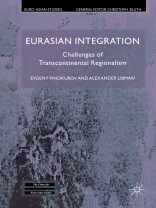The Eurasian continent, which has for over a century lagged behind in global markets, is currently gaining economic and political momentum. This book investigates emerging economic linkages in the area, examining the factors shaping this integration, the benefits and risks involved, and the future of these states on the global stage.
สารบัญ
PART I: THE CONCEPT OF EURASIAN INTEGRATION The Scope of Eurasian Integration The Waves of Eurasian Exchange Top-down and Bottom-up Integration in Eurasia PART II: EMERGING EURASIAN ECONOMIC LINKAGES Spaghetti, Noodle and Lapsha: Continental Bias in Trade in Eurasia Factor Flows in Eurasia: Mutual Investments, Evolving Eurasian Multinationals and Fragmented Labour Markets PART III: INFRASTRUCTURE OF EURASIAN INTEGRATION From a trans-European and trans-Asian to a trans-Eurasian vision of Transport Corridors Borderless Energy: Common Electric Power Markets Telecommunications Links Across the Continent PART IV: INTEGRATION THROUGH MUTUAL PROBLEMS Transborder Ecological Issues on the Continent ‘Shadow Integration’: Trafficking of Drugs, People and Arms, and the Effects of Microbes and Epidemics PART V: FORMAL INTERGOVERNMETNAL COOPERATION Variations Between Political Systems Integration of Large States Sub-Regional Aspects of Eurasian Integration PART VI: NORTHERN AND CENTRAL EURASIA: THE SUCCESSOR OF THE POST-SOVIET AREA From Post-Soviet to Eurasian Integration Central Asia at the Crossroads: a Laboratory of Eurasian Integration Conclusion
เกี่ยวกับผู้แต่ง
EVGENY VINOKUROV is Director of the Centre for Integration Studies at the Eurasian Development Bank. He has written and edited a number of monographs and papers on economic and political integration, including A Theory of Enclaves and The CIS, the EU and Russia: Challenges of Integration.
ALEXANDER LIBMAN is Assistant Professor at the Frankfurt School of Finance and Management, Senior Research Fellow at the Russian Academy of Sciences and Affiliated Researcher at the East China Normal University. Publications have appeared in Journal of Common Market Studies, Journal of Comparative Economics and Review of International Political Economy.












